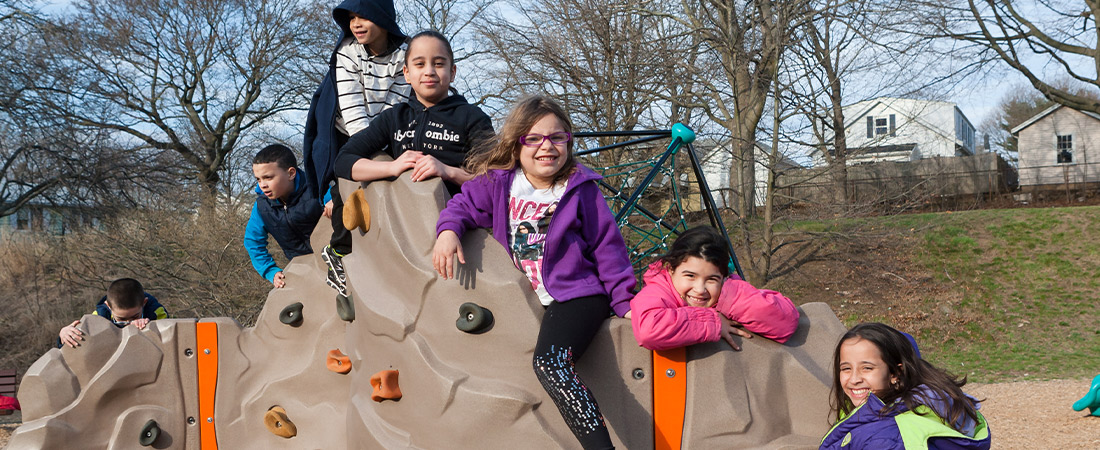
Powerful learning experiences often happen outside of the school day. EDC builds, implements, and evaluates out-of-school and nonformal programs that deliver core civic, educational, and life skills to young people in diverse environments.
In the United States, EDC’s support for out-of-school time (OST) and nonformal learning leverages children’s and youth’s strengths to help them succeed at school, engage in their communities, and lead productive and healthy lives. We design, evaluate, and provide technical assistance on high-quality OST programs that prepare young people for success—whether pursuing social and academic enrichment after school or leaving school and starting a first job.
Internationally, EDC develops and implements programs that support educational and economic opportunities for out-of-school youth. Working within the unique context of each country, we partner with governments, industry, and nongovernmental organizations to provide young people with the skills, knowledge, and opportunities they need to be market-ready and contribute to society.
Related Content
EDC Talks: How Do You Develop High-Quality Out-of-School-Time Programs?
Children can learn a lot from programs that take place outside of school hours.
4 Ways to Strengthen Youth Programs in Conflict and Crisis Areas
Building youth programs in unstable regions can be challenging. Here are four ideas for practitioners.
A Success Story in Senegal
Meet Adama Diedhiou, a participant in EDC’s workforce development program in Senegal.
A Second Chance at School in Mali
In Mali, accelerated education is helping thousands of children get back to school.
3 Ways to Stop the Summer Slide
Want to help kids keep learning this summer? Here are some tips for parents and caregivers.
New Entrepreneurs Launched in Rwanda
EDC’s workforce development efforts in Rwanda are helping young people build the skills for work.
Projects
Resources
Here are a few of our resources on out-of-school learning. To see more, visit our Resources section.
This qualitatitive study was designed to evaluate the employment and livelihoods status of several groups of participants in the Akazi Kanoze Youth Livelihoods Project after their graduation.
This brief describes how EDC works with multi-sector partners to pioneer new ways to harness the power of digital tools to support families and enhance early teaching, learning, and health promotion.
This report outlines the need to work together with new and unlikely allies, other than education actors alone, to reimagine how our interconnected systems—health, education, economic development, and the protection of our planet—can work toward Sustainable Development Goal 4: Quality Education and beyond.
EDC considers the impact of gender, inclusion, and social norms throughout the project life cycle, while respecting local culture.
This 2-page document summarizes the impact of IDEJEN, the Haitian Out-of-School Youth Livelihood Initiative, which addresses the education and livelihood needs of youth ages 15-24 with little or no primary education.
USAID Huguka Dukore Akazi Kanoze is helping to address youth unemployment by improving youth workforce readiness and employment opportunities for thousands of youth across Rwanda. This annual report presents an overview of the project as well as milestones reached during Year Two of implementation.
Honduran youths have the ability to generate strategies that can solve problems in the national context.
As Zambia’s out-of-school orphan population soared to 800,000 in 2000, the United States Agency for International Development (USAID) supported the creation of the Taonga Market Interactiv
This paper explores how the Government of Mali, with support from the U.S. Agency for International Development and Education Development Center, Inc., used innovative tools and methods (including georeferencing, mapping, and school/village surveys) to better understand the twin challenges posed by home-school distance and inefficient teacher distribution in rural communities and why Mali chose an old-school solution: one-room, multi-grade schools equipped with trained teachers and appropriate materials.
EDC developed the Educator Assessment of Learners’ Soft Skills Ability (EALSA), a formative soft skills assessment, for use with secondary and tertiary students in East and West Africa.

